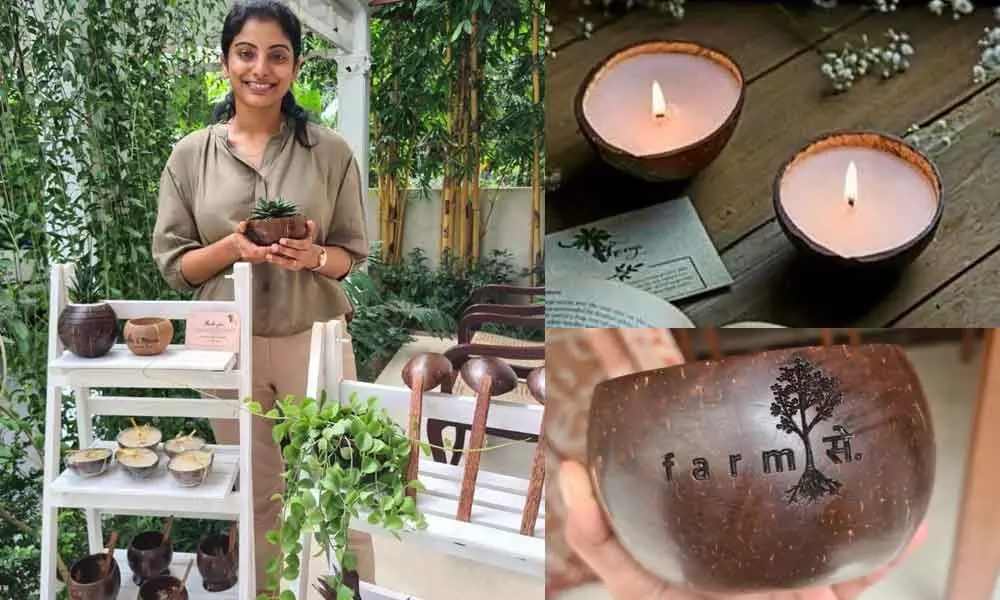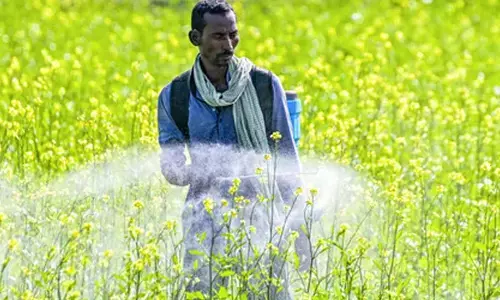She sells shells, makes a fortune

Kerala-based Maria Kuriakose
Kerala-based Maria Kuriakose, started 'Thenga', which manufacture bowls and other products from coconut shells, which were otherwise discarded as waste
The world has seen some real wise business propaganda. Making money and running the gamut by doing things that are not visible to familiar people. Today we talk about one such young entrepreneur named Maria Kuriakose, a resident of Thrissur, Kerala, who just at the 26 has made a mark for herself. We all have used coconut products, but she thought of using the coconut shell, usually discarded and dumped. So instead, she used these shells to make something meaningful that she could use in day-to-day life, like bowls, cutlery, spoons, teacups, planters, candles, etc.
She cultivated this unique idea and made this her business prospect. Once she decided to use the shells, she contacted artisans and craftsmen to understand the whole process. She needed machinery to give the shells a smooth finishing by scrubbing theirs inside as well as outside. However, she didn't want to put in heavy capital in machinery just for a trial run in the method. Her father, Kuriakose Varoo, being a mechanical engineer, stepped in to help his daughter. He sought the help of youtube videos and made an alternative low-cost sanding machine for her daughter's business idea. The sanding device helps to smoothen the inner and outer parts of the shells.
Her mother Jolly Kuriakose collected coconut scrap of various sizes from nearby and oil mills. Initially, Maria made a few bowls; she used coconut oil instead of chemicals for polishing. Her business has taken the market space, and she received an overwhelming response. What started as a journey in a home now had spread to different parts. She later contacted artisans from Kottayam, Wayanad, and Thrissur to complete work orders. Today she runs a venture named "Thenga" meaning coconut in Malayalam. The company has a turnover of around 2-3 lakhs monthly.
Excerpts from the Interview:
What inspired you to initiate this business?
My inspiration is my childhood dream to start my own business. But, I was not sure about how to go about creating it. So, after my schooling, I took economics for my further studies. I went from Kerala to Mumbai to study, then went abroad to do my business administration. I came back from abroad, took up a corporate job for a couple of years. Then also worked for a startup for two years. But starting my own business was always there in my mind. It was like I always wanted but couldn't begin with it. So eventually, I thought of giving it a try, and that has been my inspiration.
Kerala is famous for its coconut and its natural environment. Does that work in your favour? Or is it just an idea that came at once, and you gave your devotion to it?
I had this feeling that whenever I start my business, it will be something I am very passionate about. It shouldn't be just like going to an office, Starting at 9 AM and ending my day at 5 PM. So, my business idea was to work on something that I love and feel passionate about it. Eco-friendly products and natural materials are some things that I am passionate about. I am also very attached to natural living methods as I come from Kerala and live in sustainable practices. So I have tried to teach all that in my life. So when I wanted to start my business, it was naturally coming back to Kerala and working on some Kerala agricultural products. Coconut is the primary agricultural cropping in Kerala. Coconuts find majorly discarded their use in multiple ways, like coconut oil, coconut flesh for milk, coconut water but coconut shells. Which is mainly used for coir; this waste is utilised to add value to it. So that is how this idea came, and I started experimenting with coconut shells. I started giving it out as samples in the market and got a good response. That is how made the brand.
What type of products your company offers, and can you tell us about their sustainability?
The range of products is from coconut bowls to cutlery sets to teacups, planters, candles, salt and pepper shakers. Coconut shells are round in shape; hence whatever products like bowls or cutlery we make by considering the round shape. We can't use it to make plates or anything which is plain in form. We are trying to see what new products we can develop with the shapes. We have different sizes of bowls, cups, cutlery, candles, planters, and cooking spoon. So basically we are making products related to home decor and kitchen shelves.
We often talk about zero waste. What other eco-friendly products, do you use in your day-to-day life apart from your products?
My personal favourite is the bamboo brush. Unfortunately, we have to replace it every three months. Toothbrushes use a lot of plastic; hence switching from plastic brushes to bamboo is very satisfying. I generally avoid buying plastic products may it be in the kitchens or containers. I prefer glass materials which go for a long time and don't have to buy them frequently.
Hand-made products are often expensive. How do you see the market in these terms?
Natural products are mostly handmade hence it tends to be expensive, unlike bulk-produced factory products. It is more costly as we have worked a lot behind it. Coconut shells last for several years or even decades. So, it is more of an investment that you make. It's expensive, one time, yes, but if you see the number of years you will use it, it's not that expensive. Our product range starts from Rs 300-500/-. Since products are long-lasting hence it's not costly from that point of view.
Additionally, it is an excellent contribution to the environment in two ways. First, it reduces waste, and second, no trees are being harmed by us in the process. Shells that would have gone into the landfills are now made up into beautiful products.
People might be skeptical of the fact whether the products are heat resistant or not? What is your take on that?
Usually, we have different types of bowls. We advise the customers to avoid using hot soups for bigger size bowls because the shells thickness is a little lower. But for smaller-sized shells made into teacups or spoons, we can use it both for hot and cold purposes.














